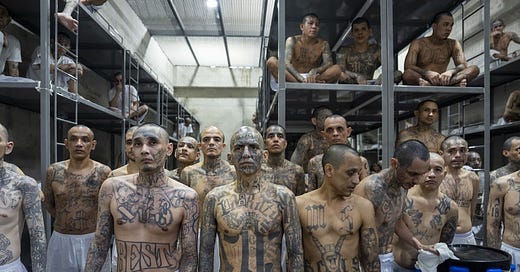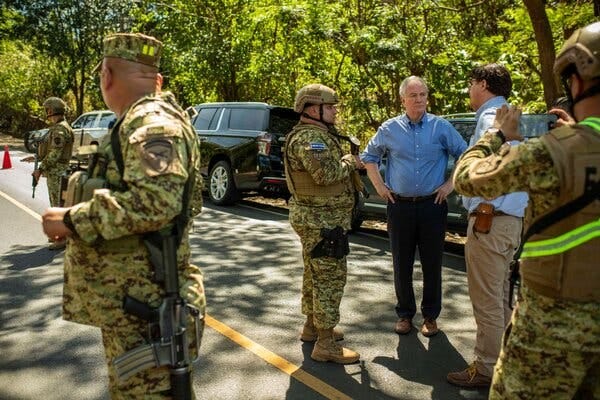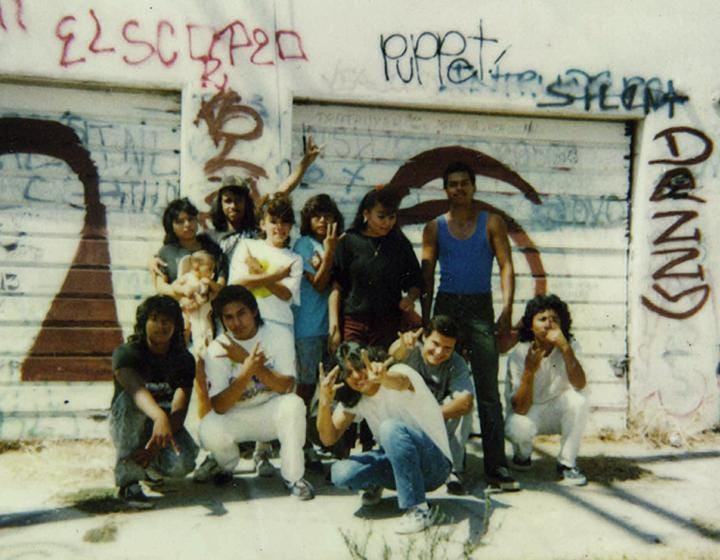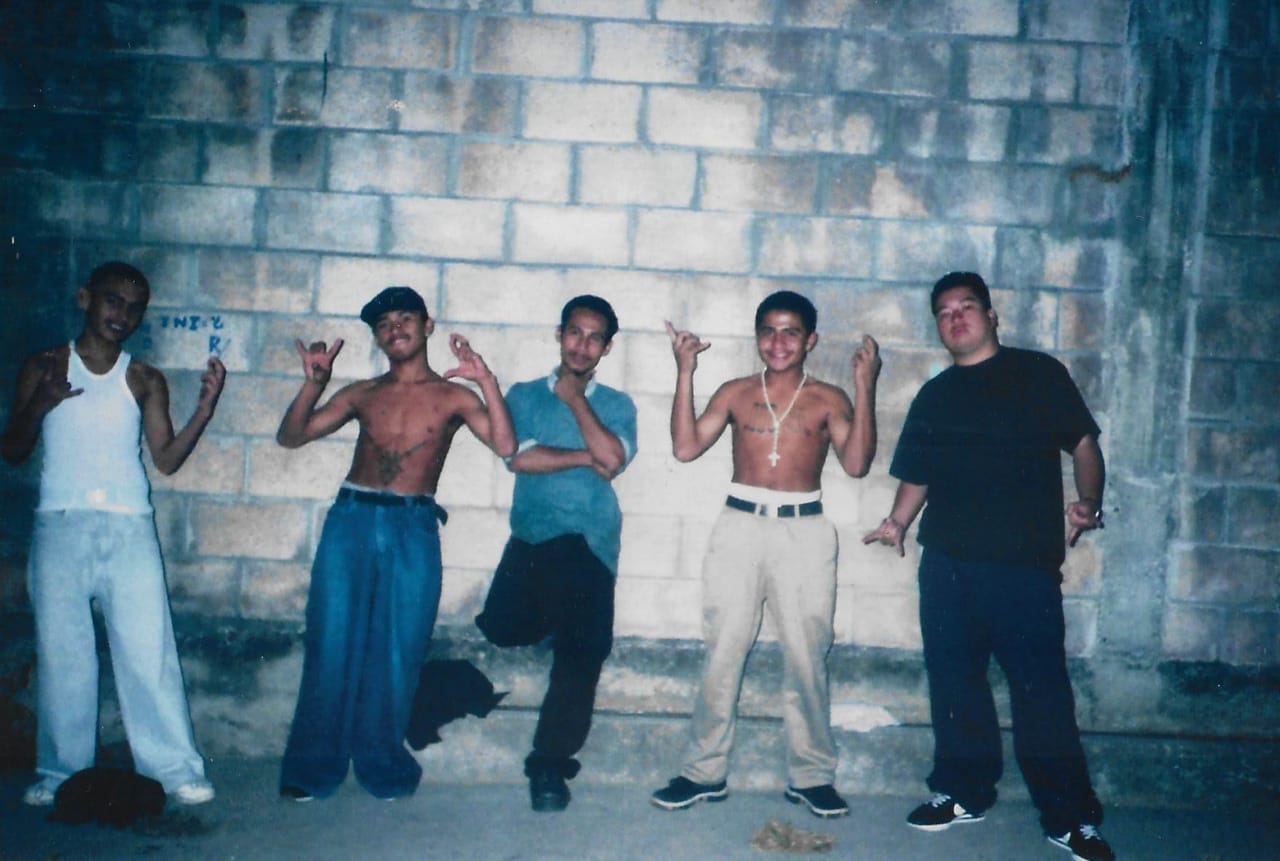How the US Created The Gang That Ruined El Salvador: MS-13, Explained
The Full Circle of American Policy: From Fueling Civil War to Deporting Those Who Flee Its Aftermath
Senator Chris Van Hollen was blocked by armed military officials from visiting Kilmar Armando Abrego Garcia, who has been imprisoned for over a month in El Salvador's maximum-security CECOT prison. This is despite the fact that Abrego Garcia had been living legally in Maryland under a federal judge's order granting him protection from deportation.
The Trump administration, in defiance of both this order and common humanity, sent him back to a country where he faces deadly gang violence. The cruel irony? The gang Abrego Garcia fled from—MS-13—was born on American soil.
I'm fighting to document stories of refugees like Kilmar Abrego Garcia before they're dismissed as 'liberal hysteria' or erased entirely—and I need your help! With no corporate backing or wealthy sponsors, this work depends entirely on readers like you. If everyone reading this became a paid subscriber, I could document these crucial stories full-time, but right now less than 3% of my followers are *paid* subscribers. If you believe in journalism that stands up for historical truth when others won't, please consider a paid subscription today!
Senator Van Hollen's Blocked Visit: Partisan Politics and Deportation
What makes the Van Hollen incident particularly disturbing is its stark contrast with treatment afforded to others. Just days before the Maryland Democrat was turned away, several Republican members of Congress received full tours of the same prison. This partisan disparity in access speaks volumes about the political motivations behind Abrego Garcia's continued detention.
"This was a very sort of simple humanitarian request," Van Hollen explained after being blocked. The incident represents a remarkable escalation in the showdown over President Trump's immigration policies, with Democrats placing Abrego Garcia's case at the center of their challenge to the administration's approach. Meanwhile, White House Press Secretary Karoline Leavitt has accused Van Hollen and supporting Democrats of lacking "any shred of common sense or empathy for their own constituents."
MS-13's Los Angeles Origins: How Salvadoran Refugees Formed Gangs for Protection
To understand the cruel absurdity of Abrego Garcia's deportation, you need to understand where MS-13 came from in the first place – not the mountains of El Salvador, but the streets of Los Angeles.
MS-13, or Mara Salvatrucha, was formed in Los Angeles in the 1980s by the children of Salvadoran refugees fleeing a brutal civil war. This wasn't just any civil war – it was one where the United States government poured billions of dollars into backing El Salvador's right-wing military government against leftist guerrillas. U.S.-trained Salvadoran death squads committed horrific massacres like the one at El Mozote, where nearly 1,000 civilians were slaughtered. While the Reagan administration certified "progress" in human rights to keep military aid flowing, Archbishop Oscar Romero and four American nuns were among the tens of thousands murdered by U.S.-backed forces.
These young immigrants found themselves in neighborhoods dominated by Mexican-American gangs and formed their own gang for protection and a sense of belonging. The "13" in their name pays homage to the Mexican Mafia prison gang, while "Mara" is slang for "gang" and "Salvatrucha" combines "Salva" (for Salvadoran) with "trucha" (street-smart).
The Salvadoran civil war would eventually claim over 75,000 lives in a country smaller than Massachusetts. As civilians fled the carnage, many made their way to the United States, with significant communities forming in Los Angeles, Washington DC, and other major cities. But their children, growing up caught between two worlds and facing discrimination, poverty, and violence, became easy recruits for gangs that offered protection and identity.
The 1990s Deportation Wave: How US Immigration Policy Exported Gang Culture to El Salvador
Here's where American policy made a critical mistake that reverberates to this day. After peace accords were finally signed in El Salvador in 1992, the United States began aggressively deporting Salvadoran gang members under the 1996 Illegal Immigration Reform and Immigrant Responsibility Act. Approximately 4,000 gang members with criminal records were sent back to a country many barely remembered.
The problem? El Salvador had been devastated by war. Its institutions were weak, corruption was rampant, and poverty was widespread. Perfect conditions for gang culture to take root and explode. MS-13 members, many of whom spoke better English than Spanish and had few connections in El Salvador, did what they knew how to do – they recreated their gang, recruited new members, and established dominance through violence.
Anthropologist Juan José Martínez d'Aubuisson, who spent a year embedded with an MS-13 clique in El Salvador, described how gang members deported from the US brought with them American gang culture, urban warfare tactics, and prison networks. They found a ready pool of recruits among El Salvador's jobless youth. The gang expanded rapidly, establishing control over neighborhoods through extortion, murder, and intimidation.
In recent years, MS-13 had an estimated 50,000 to 100,000 members concentrated in the "Northern Triangle" of Central America: Guatemala, Honduras, and El Salvador. They transformed from a street gang into a transnational organization that controls entire neighborhoods, challenges state authority, and fuels the region's extraordinary homicide rates. El Salvador has consistently ranked among the world's most violent countries not at war. That is until recently, when the current president rounded up thousands of gang members and put them in the notorious prison that undocumented migrants in the US are being sent to right now.
Current Migration Crisis: Salvadorans Fleeing Gang Violence Created by US Policies
It's a tragic cycle: US-backed violence created refugees who formed gangs for protection in America. America deported gang members back to a war-torn country where gang culture exploded. Now, civilians fleeing that gang violence come to America seeking asylum, where they're demonized as criminals and deported yet again.
Kilmar Abrego Garcia is just one victim of this twisted history. He fled El Salvador to escape MS-13 violence – violence that exists because of decades of misguided US policy. After building a life in Maryland under legal protection, he was seized by immigration authorities and sent back to face the very danger he escaped.
And he's far from alone. Thousands of Salvadorans, Hondurans, and Guatemalans arrive at the US border each month seeking asylum from gang violence. Many are families with children. Instead of recognizing our country's role in creating this crisis, the current administration has implemented increasingly severe measures to keep them out – from family separation to forcing asylum seekers to wait in Mexico for court hearings, and now, illegal deportations of people with legal protections.
The administration has even used the specter of MS-13 to justify these harsh policies, with the president repeatedly referring to gang members as "animals" and claiming they "infest" American communities. This rhetoric conveniently ignores that MS-13 represents less than 1% of all gang members in the United States, and that immigrants are statistically less likely to commit crimes than U.S.-born citizens.
Current Anti-Immigrant Rhetoric: How Political Discourse Ignores Historical US Involvement
Senator Van Hollen's failed attempt to check on Abrego Garcia's welfare reveals the cruel endpoint of this circular history. When asked about returning Abrego Garcia to the United States, President Trump deflected responsibility, saying, "Well, I'm not involved. You'll have to speak to the lawyers, the D.O.J."
Meanwhile, White House Press Secretary Karoline Leavitt denounced Van Hollen's humanitarian mission, claiming it showed a lack of "common sense or empathy" for American citizens. In the same briefing, the administration paraded Patty Morin, mother of a Maryland resident murdered by a Salvadoran immigrant, to justify its stance – a cynical exploitation that ignores broader statistics on immigrant crime rates.
The administration has announced it is receiving $6 million from the US government to hold deportees in Salvadoran prisons – essentially creating a shadowy offshore detention system outside US legal oversight. Human rights advocates have documented overcrowding and reports of torture in these prisons.
"My whole argument is we have a court where the whole purpose of having a hearing was for people to present their evidence," Senator Van Hollen said, highlighting the fundamental issue: Due process has been abandoned in favor of expedient deportations.
Historical Amnesia in Policy Decisions: The Consequences of Forgetting US Involvement
The current situation represents a moral crisis as much as a policy one. How do we reckon with our country's role in creating the conditions driving migration from Central America? How do we acknowledge our historic complicity while crafting humane immigration policies for the present?
What's happening to Kilmar Abrego Garcia – blocked from even the basic humanity of a visit from his elected representative – should force us to confront these questions. His story stands at the intersection of past US intervention, gang violence, immigration policy, and human rights. To ignore any part of this history is to ensure we'll continue making the same devastating mistakes.
Policy Recommendations: Breaking the Cycle of Intervention and Migration
Breaking this cycle requires acknowledging the United States' role in creating the conditions driving migration from Central America. It means implementing immigration policies that recognize our historical responsibility rather than criminalizing victims. And it means addressing the root causes of gang violence to stop it in its tracks.
For Kilmar Abrego Garcia, it means immediate return to the United States, where he was legally protected from deportation. For others like him, it means fair asylum hearings and due process, not expedited removals and military blockades.
As Senator Van Hollen put it, "When you start picking on the most vulnerable people, and you push and push and push, and you get away with it, then you take the next bite." What happens to Abrego Garcia today could happen to others tomorrow.
Before you go, help preserve Kilmar’s story (and the story of others like him …)
If you believe that confronting the truth of our past is essential to any claim this country makes toward justice, then I ask for your support.
Over 16,000 of you have subscribed to this newsletter.
But less than 3% of you are paid supporters.
That makes it hard to keep this going, especially when platforms like TikTok and Instagram are so unstable. I’ve had videos removed, been mass-reported by trolls, and constantly worry about getting shadowbanned or banned completely.
This newsletter is one of the only spaces where I can share these stories without censorship. But I need help to grow it.
📖 If just 5% of you became paid subscribers, I could start bringing on professors, historians, and other experts to unpack these issues in even deeper ways.
🧠 If 10% signed up, I could quit everything else and go full-time — publishing multiple articles a day, covering the latest news and connecting it to the hidden histories they don’t teach in school.
🌎 And if 20% of you subscribed, I could turn this into a platform that lifts up other truth-tellers. Young writers, educators, and creators who are brilliant but have nowhere to share their voice. Especially those from marginalized communities who get ignored by traditional media.
References
"Maryland Senator Turned Away From El Salvador Prison by Military." The New York Times, April 17, 2025.
American Archive of Public Broadcasting. "Salvadoran Civil War (1979-1992)." In "Burning with a Deadly Heat": NewsHour Coverage of the Hot Wars of the Cold War. Library of Congress and GBH, accessed April 17, 2025.
"The US Created MS-13." Jacobin, August 26, 2019.
"How the US helped create El Salvador's bloody gang war." The Guardian, January 10, 2020.
"The Myths of Central American Undocumented Immigration and MS-13 in the United States." California Western International Law Journal, 2020.
"The Omnipresent Business of the MS13 in El Salvador." InSight Crime, January 25, 2022.
"How Los Angeles Taught the Mara Salvatrucha to Hate." El Faro, August 23, 2023.











The entirety of this story, including this history, makes me insane with rage. Rage which I will use to fuel my own efforts to try to effect change through activism however I can. I’ve been waiting to become a paid subscriber until I get a higher paying job, but this article today has pushed me over the edge. Thank you, Kahlil, for your courageous journalism and willingness to share the hardest truths this country has to offer. Great work ❤️🔥
Kahlil Greene’s writing is phenomenal. Every piece I read is interesting, well researched, informative and important!